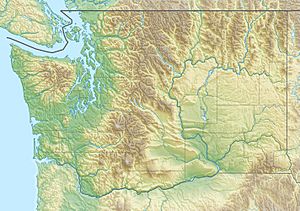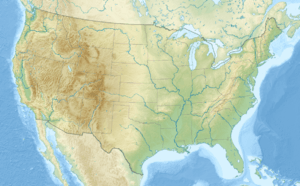Clallam River facts for kids
Quick facts for kids Clallam River |
|
|---|---|
|
Location of the mouth of the Clallam River in Washington
|
|
| Country | United States |
| State | Washington |
| County | Clallam |
| Physical characteristics | |
| Main source | Olympic Mountains 48°10′16″N 124°17′41″W / 48.17111°N 124.29472°W |
| River mouth | Strait of Juan de Fuca Clallam Bay 48°15′19″N 124°15′49″W / 48.25528°N 124.26361°W |
| Length | 15.7 mi (25.3 km) |
| Basin features | |
| Basin size | 31.1 sq mi (81 km2) |
The Clallam River is a cool river located in the state of Washington, in the United States. It stretches for more than 15.7 miles (25.3 km), which is about the distance from one end of a big city to the other! It's part of a group of rivers in the area, like the Pysht River and Hoko River.
Where Does the Clallam River Flow?
The Clallam River starts high up in the Olympic Mountains, close to a place called Ellis Mountain. From there, it flows mostly north. As it travels, it collects water from smaller streams, which are called tributaries. Some of these include Blowder Creek, Charley Creek, Last Creek, and Pearson Creek.
Eventually, the river reaches Clallam Bay. This bay is actually part of a much larger body of water called the Strait of Juan de Fuca. The town of Clallam Bay is right where the river meets the sea. This spot is known as the river's mouth.
What Animals Live in the Clallam River?
The Clallam River is a very important home for many types of fish. You can find different kinds of salmon here, like coho, chum, and Chinook salmon. These fish are famous for swimming upstream to lay their eggs.
The river also has steelhead and coastal cutthroat trout. Steelhead are a type of rainbow trout that spend part of their lives in the ocean before returning to fresh water.
Why is the River's Mouth Unusual?
The Clallam River has a unique feature at its mouth. Sometimes, sand and gravel build up and block where the river usually flows into the sea. When this happens, the river's lower part runs right next to the ocean, but behind these gravel barriers.
Over time, especially when there's a lot of rain and the river flows strongly, the water breaks through the gravel in a new spot. This can be a problem for fish trying to migrate. For example, in July 1998, many steelhead trout got stuck behind these gravel barriers. Luckily, a group called the Pacific Coast Salmon Coalition helped clear a path, allowing the fish to swim free.
 | Kyle Baker |
 | Joseph Yoakum |
 | Laura Wheeler Waring |
 | Henry Ossawa Tanner |



